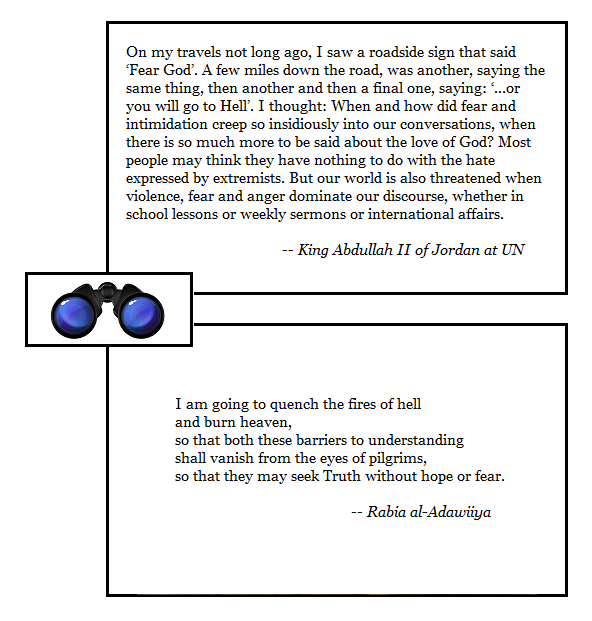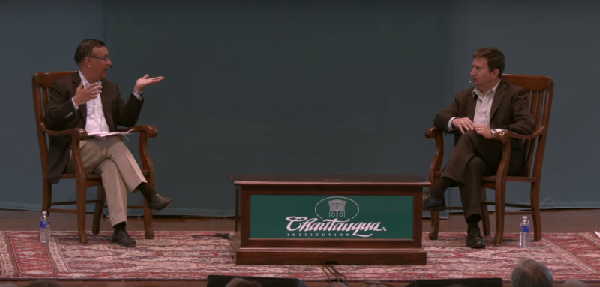Jordan Peterson, ouroboroi, paradise, and so forth
Wednesday, March 28th, 2018[ by Charles Cameron — oh damn, cameron’s on about the ouroboros again, when do we get to strategy? ]
.
A slide from a youtubed lecture:
**
I have found someone who gives emphasis to many of the things I give emphasis to, and which few other peple emphasize. And FWIW, the Jungians do this better than most, but then I’ve been reading and appreciating them for ages. This is new.
Okay, Jordan Peterson. He’s been thinking across a wide range of fundamental concepts for many years now, and considerable fame has accrued to him. How I managed not to notice him until now, I’ll never know. Here he is, anyhow —
— with that ouroboros slide faintly visible behind him. The limits of vision, faintness included, are among his many interests, FWIW.
**
I’ve read Tanner Greer‘s recent critique of Peterson, which was enough to catch my inner eye, and then today there was an invite from Zen —
@hipbonegamer you wanted to know about Peterson’s “map” concept https://t.co/YIA1jEVK9U
— mark safranski (@zenpundit) March 25, 2018
Hell yes.
And I’m maybe ten minutes into that lecture, have skipped around a bit, and went back to lecture #7 for a clear shot of the ouroboros behind him, which I’ve now inserted at the top of this post.
**
Peterson’s ouroboros is a conflation of a bird, a cat and a snake — wings, claws and venom — birds, cats and snakes being the three classes of being that can kill you from a tree. A “winged, legged serpent” — the “dragon of chaos”. That’s not how I get to the ouroboros, and my equivalent interest is in its recursive nature.
I wrote the poem below, as far as memory serves, in the Anscombe-Geach living room, heart of Oxford’s superb logic team at the time, back in the mid nineteen-sixties, and published it, I think, in Micharel Horovitz‘ 1969 anthology of Britain’s equivalent of the USian beat poets, Childrenn of Albion — wow, of which you could have purchased Amazon’s sole remaining copy for $729.32 as I was writing this — now it’s only $32.57 — is that a difference that makes a difference?
Here’s the poem:
I formatted it more recently in a HipBone Games manner, as a single move with a recursive tail.
**
Another significance of the ouroboros for Peterson is that the serpent (antagonistic to us) guards a treasure (to be desired)..
So along with recursion, we have predatory chaos, aka the unknown and indeed unknowable unknown, and the treasure trove or hoard. And as you might intuit, it’s a short leap from there to the word-hoard — poetry in the palm of your mind, with an early mention in Beowulf.
Here are a few gems from Peterson’s seemingly inexhaustible hoard:
there’s no place that’s so safe that there isn’t a snake in it.. even God himself can’t define the space so tightly and absolutely that the predator of the unknown can’t make its way in.. that’s the story of the garden
— and those are from maybe a three minute stretch of a two hour lecture — the word means “reading” — one of forty, is it, in the series?
**
Phew. I just received the book, Maps of Meaning: The Architecture of Belief, from Amazon —
— the print is small — too small for me — stronger glasses coming soon..
**
Look, Stormy Daniels was just on 60 Minutes, offering prurient interest under cover of adversarial politics, how could I resist? I could have watched ten more minutes of Peterson video, and grabbed twice the number of notes I’ve made here — but that can wait.
Stormy Daniels and her lawyer, Michael Avenatti, can show you strategy..
Ah, but Jordon Peterson can show you abstraction.
**
Consider the recent school shootings. I go back to Columbine.. Peterson goes back to abstraction, mapping, and time-space:
For example, we’re all sitting in this room, and someone leaps in with a weapon.
It’s like this was known territory a second ago, and now it’s not known territory at all. Even though you’d say, well many things have remained the same, it’s like, yeah, but all the relevant things have suddenly changed, right? And so part of the way of conceptualizing that is that you can manifest a geographic transformation by moving from genuine geographic explored territory into genuine unexplored geographic territory. But you can do that in time as well. Because we exist in time as well as space. And so a space that’s stable and unchanging can be transformed into something completely other than what it is, by the movement forward of time. So why am I telling you that? It’s because we’ve mapped the idea of the difference in space, between the known and the unknown, to the difference in time between a place that works now and a place that no longer works, even though it’s the same place, it’s just extended across time.
Consider the recent election:
That’s what an election does, right?
It’s like, we have our leader, who’s the person at the top of the dominance hierarchy, and defined the nature of this particulatr structure. There’s an election, regulated chaos, noone knows what’s going to happen, it’s the death of the old king, bang! We go into a chaotic state, everyone argues for a while, and then out of that argument they produce a consensus, and poof, we’re in a new state, like that’s the meta-story, right, order > chaos > order, but it’s partial order, chaos, reconstituted and revivified order — that’s the thing, that this order is better than that order, so that there’s progress, and that’s partially why I think the idea of moral relativism is wrong – there’s progress in moral order.
Note:
plenty of intelligence no actionable intelligence a high level of abstraction following the logic of evolution not the logic of logic too paradoxical for that
**
That’s more than enough.
Au revoir, quite literally!








